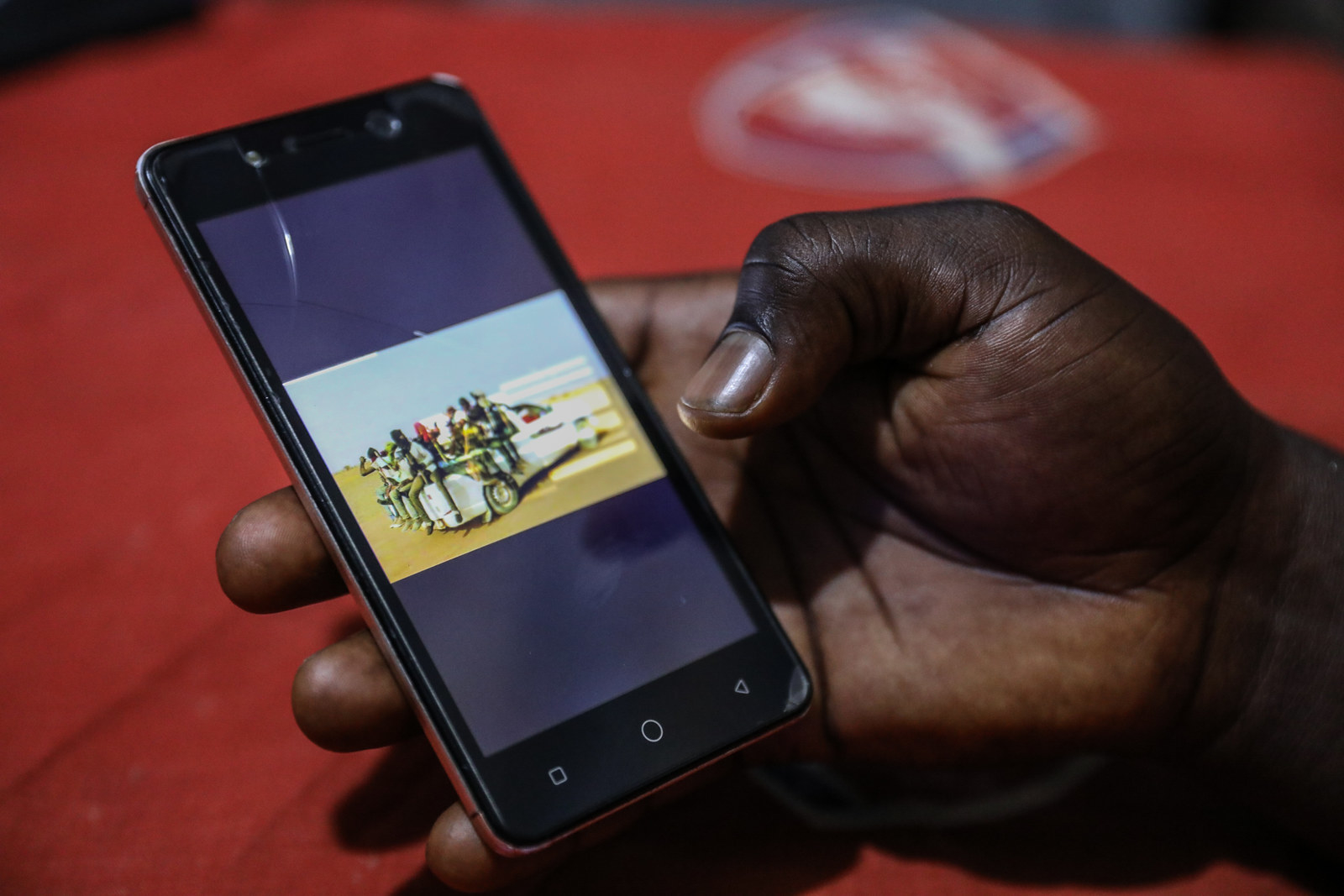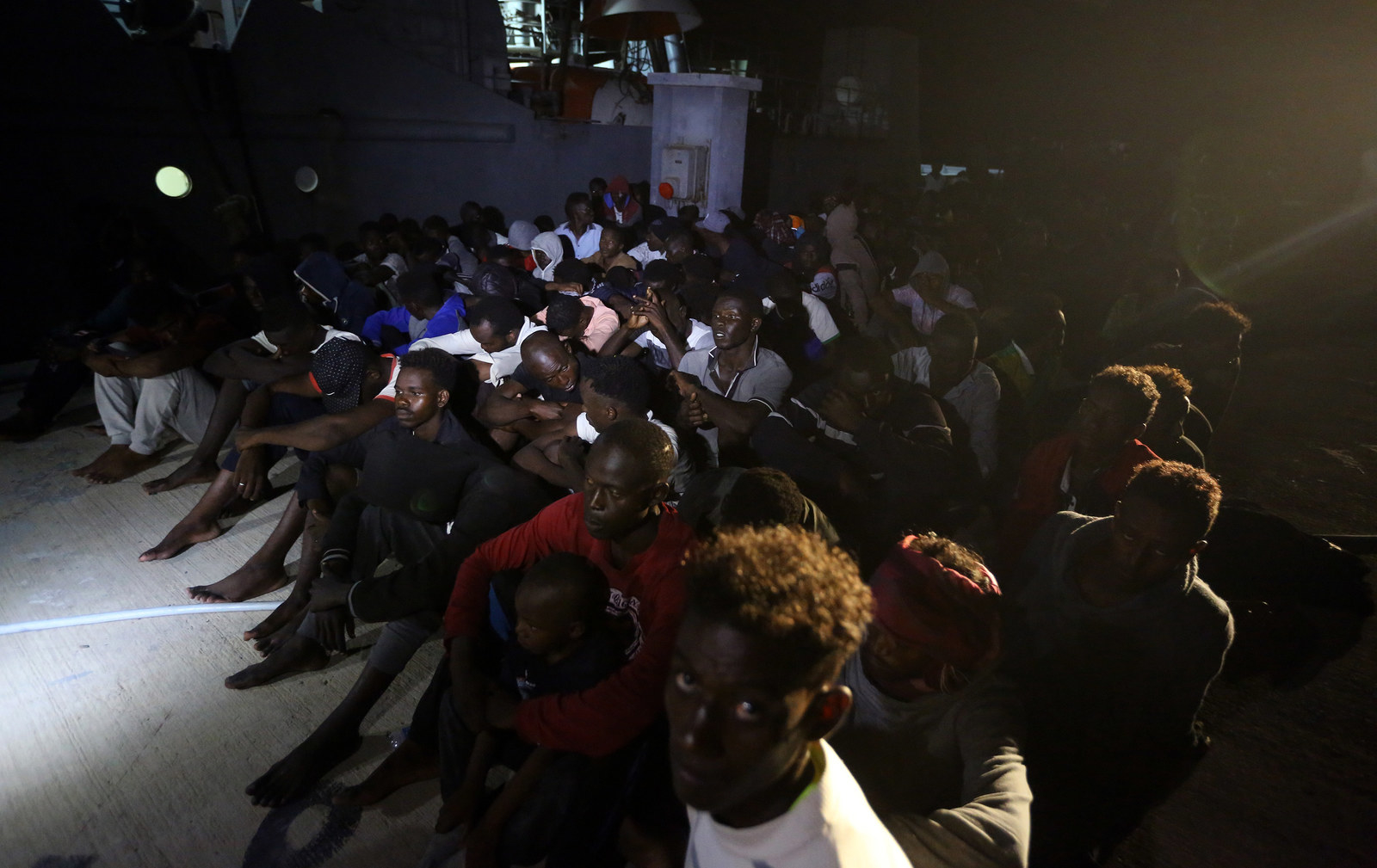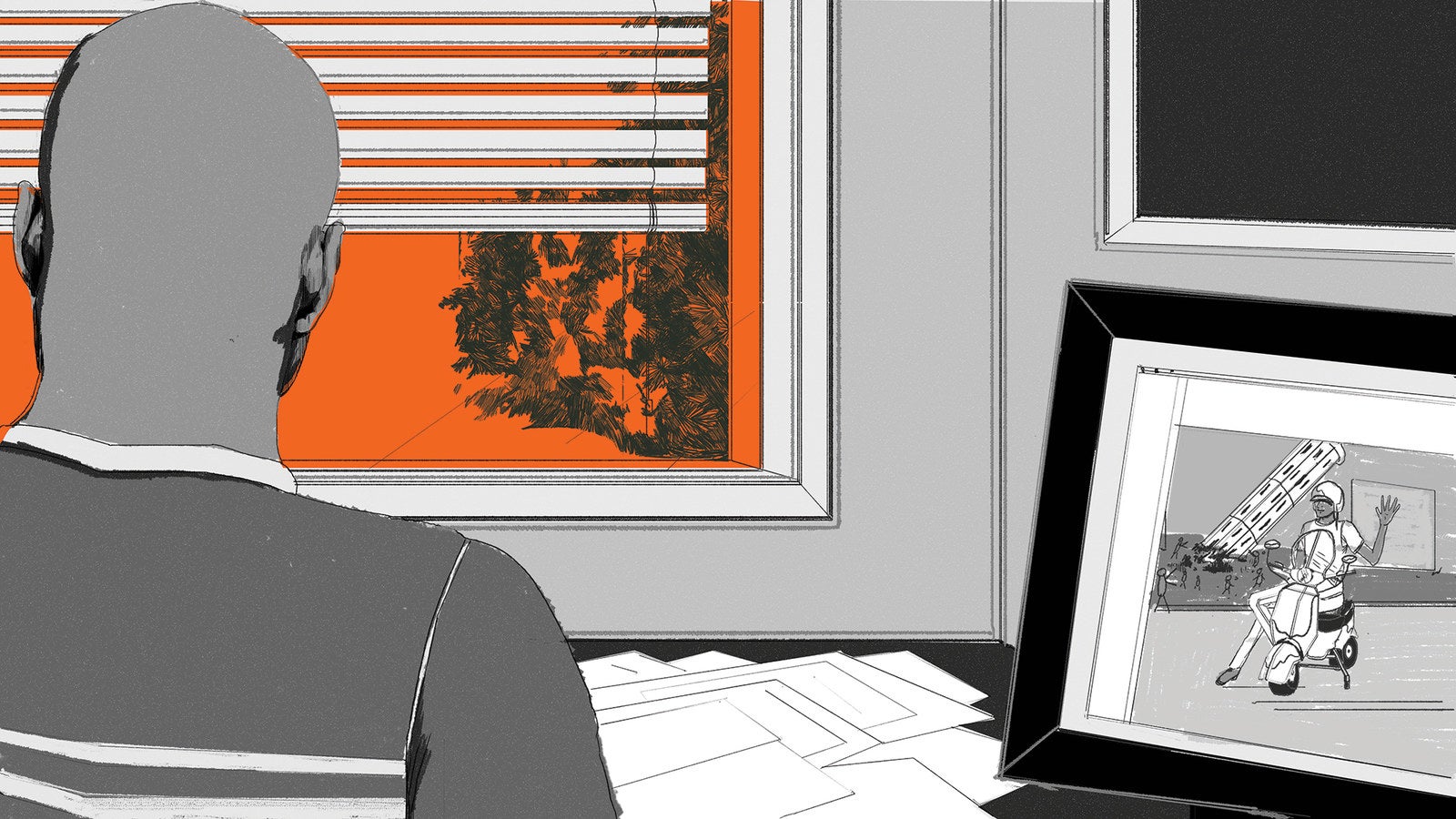Slavery is thriving in Libya, where thousands of black Africans hoping to get to Europe instead find themselves bought and sold, forced to work for nothing, and facing torture at the hands of their owners.
Nobody’s there, he tried to reassure himself for the tenth time since he had stepped out a few minutes earlier in search of water, along with three of his friends. The sandy side streets were deserted, every shop and café shuttered. It was a Friday afternoon, which meant even the armed militias who ruled Sabha, a sprawling oasis city 480 miles inland from the coastal capital, had filed to mosques for the most important weekly prayers.
Then came the sound again — the unmistakable purr of an engine.
Wordlessly, all four men scattered.
Ikuenobe felt like he was running through quicksand. As the car sped closer, he knew a single misstep could mean being gunned down and dying anonymously in the street.
All the warnings he’d heard flashed through his mind.
“In Sabha, every black man is a target.”
“We black in Libya — we’re money to Arabs. The minute they get us, they can sell us.”
“If they are coming, just run. Run for your life.”
Ikuenobe ran, and kept running even as there was a screech of tires, the smell of burning rubber, and a volley of gunshots. He kept running as one of his friends hit the ground with a thud. He ran until his legs gave way in an unpaved alleyway, and he collapsed onto the sandy ground, drenched in fear and sweat.
It took him several hours, on shaky legs through labyrinthine back roads, to slip back into the walled compound where he had spent the last three weeks. The building was no sanctuary, and Ikuenobe knew the owner of the compound would dole out a vicious beating, but he had nowhere else to go.
At least he was alive — none of his friends had made it back at all.
Want to support more reporting like this? Become a BuzzFeed News member today.

Ikuenobe shows a photo of the truck used to carry him to Libya.
Slavery typically conjures up images of ships transporting black Africans across the Atlantic, or the death marches of the trans-Saharan slave trade. But this modern-day version has added a cruel twist — this time, people from sub-Saharan Africa are often selling themselves into slavery, believing they are buying a ticket from a life of conflict, poverty, or repression to a glittering future in Europe. In a grim irony, the very policies of a European Union that is hardening itself against immigration are largely responsible not only for preventing people from reaching the continent, but their becoming enslaved and dying in their attempts to escape.
Few places could be further from the promised land than current-day Libya, where tens of thousands are detained indefinitely, spend years working for arbitrary sums or without pay altogether, and are at constant risk of being kidnapped, sold, and auctioned from one militia to another. In a country where chaos is the rule, some experts argue that such treatment doesn’t amount to slavery, a view that downplays the racism underlying the situation.
Ikuenobe had ended up trapped in Libya after leaving his hometown of Benin City, a verdant city of low-rise buildings in southwestern Nigeria, in search of a better life in Europe. He had planned for a two-week journey northward across the Sahara desert into Libya, from where he would set off in a boat across the Mediterranean. Instead, he found himself spending more than two years trying to survive in the underbelly of modern-day slavery.

People at a naval base in Tripoli, after being rescued off the coast of Libya, on July 30, 2018.
Starting in 2014, images of desperate people crammed onto boats as they tried to cross the Mediterranean began to appear on TV screens. The “migrant crisis” soon upended European politics, unleashing a wave of far-right populism and anti-migrant rhetoric.
The European Union began pulling up the drawbridge, and debates flared up around the legality and morality of its “stop the boats” policy. But its darkest consequences were often erased from the narrative: the tens of thousands of black Africans entrapped in a growing slave market.
In November last year, a video that could have been lifted from a 300-year-old time capsule went viral. On grainy cellphone footage obtained by CNN, a group of black Africans were shown being auctioned as slaves somewhere in Tripoli, Libya’s capital. Offscreen, a slave trader repeatedly emphasized the strength of the black men for sale: “This is a digger, a big strong man,” he said, a proprietorial hand on another man’s shoulder. A Nigerian man in his twenties, his eyes blank with fear, was offered as part of a group of “big strong boys for farm work.” The men were sold for $400 each.
The Tripoli-based government reacted by launching a committee it said would bring those responsible to justice — although a year on, no findings have been made public. The UN-backed presidency said: “We, in Libya, are victims of illegal migration and we are not a source for it.” Shortly after the footage was published by CNN, Libyan media described it as “fake news,” using a tweet by US president Donald Trump that attacked the news channel as a way to discredit its reporting on slavery in Libya.
The slave auction video, it emerged, was the tip of the iceberg of a forced labor market estimated to be worth $150 billion worldwide. Images resurfaced of black Africans being detained by militias in cages in Tripoli zoo. There were videos of Libyan coast guards whipping terrified black women and children at sea.
Perched on the northern coast of Africa, some 120 nautical miles across from the Mediterranean coast of Italy and Malta, oil-rich Libya has long served as a launching-off point for Europe. For nearly four decades, migrant numbers were controlled by the country’s flamboyant dictator, Muammar Gaddafi. He periodically threatened to unleash an “influx of starving and ignorant Africans” who would turn the mainland into a “black Europe” — in order to wrangle cash-for-migration-control deals.
In 2008, he secured a $5 billion reparations deal from Italy, a former colonial power; in exchange, Gaddafi would stem the flow of refugees. That paved the way for both countries to start capturing asylum-seekers and returning them to Libya, until the European Court of Human Rights ruled the deal broke human rights laws. The self-named “king of kings of Africa” then began demanding 5 billion euros ($5.67 billion) annually from the European Union.
After the Arab Spring and the US-led bombing campaign toppled Gaddafi in 2011, Libya was carved up between a UN-recognized central government in Tripoli, another in the east, and dozens of militias vying for control of the south. Migrant routes that had previously been controlled under Gaddafi suddenly opened up again.

Primary migrant routes through Libya on the way to Europe in 2016. Source: UNHCR Libya
Panicked European governments turned to a familiar playbook. Through EU and UN security and funding agencies, they poured sophisticated surveillance equipment, warships, and billions of euros into countries across Africa — with Libya as the centerpiece — in an effort to push back, return, or contain would-be arrivals. With no strongman ally this time around, that money has been channeled toward training Libya’s coast guard and funding migrant-holding centers — even when news emerged of coast guards firing on refugee boats or militia-run labor camps.
But critics fear that without dealing with the root triggers of migration, these kind of border controls are short-sighted at best. Sealing one route simply opens another one. It’s like playing a high-stakes version of whack-a-mole — but the question is how long is it sustainable, and at what human cost?
Fewer people are making it to Europe, but more are dying, disappearing, or being abused en route — except it’s no longer happening on the shores of Europe. Yet every step of Ikuenobe’s journey into slavery was shaped not just by conflict or poverty in Africa, but also directly by Europe’s policies on migration.

Ikuenobe wasn’t willing to risk everything to get to Europe — he just believed slavery was a thing confined to the history books he’d read at school. Tall, broad-shouldered, and dimple-cheeked, Ikuenobe spent his free time playing football or attending activities organized by his local church. A political science graduate, he was often teased by friends who said he had squandered his true talents by not playing for Arsenal soccer team, whose colors draped his room at home.
His journey into captivity began one evening in July 2015, when he was scrolling listlessly through his Facebook feed after yet another visa application at the US Consulate office. It was the fourth time that year he’d painstakingly filled out the forms, forked over money from his dwindling savings, and sat through a humiliating interview in an embassy. And for the fourth time, his request came back: application denied.
Depressed, Ikuenobe was about to log off when a familiar face popped up under the “people you may know” tab. His initial joy at reconnecting with Asiri, an old school friend, was soon replaced with a typical reaction Facebook engenders: FOMO. Except this wasn’t a fear of missing out on concerts or travel or parties — his dwindling bank account saw to that every day. This felt like his whole life was slipping by.
His former classmate had ended up in Italy, where he’d found a job as a waiter. According to the glossy version of his life on Facebook, he’d saved enough to buy a Vespa and would soon be putting a deposit on an apartment. “Where he was, you know the atmosphere was different. Everything looked fresher. It looked good,” Ikuenobe recalled, sitting in the same room in his family home where he’d been that evening three years ago.
All Ikuenobe ever really wanted to do was work. After graduating in 2013, he’d traveled 7,000 miles across the Atlantic to Mexico, where he got a job in a textiles factory. It wasn’t exactly his dream job, and he was homesick every day, but the paycheck of $800 provided enough to send money back to his family and help put his five younger siblings through school. But just over a year later, he had to return to Nigeria to complete his compulsory national youth service — a requirement if he wanted to eventually settle down back home.
After finishing his service, his plans to find another job abroad were crushed by the reality of Nigeria’s job market — there weren’t enough jobs that allowed him to save, and every legal door to emigrating slammed shut. He began pawning treasured possessions, including the peacock blue Toyota Camry he’d bought when he first returned from Mexico.
The next day, he called the number Asiri had given him. The man on the end of the line sounded warm and friendly. He could open doors northward from Nigeria, through its landlocked neighbor, Niger, and finally to Libya. From there, Europe would be within his grasp.
“He told me that in one week, I will be in Europe. I was like —,” Ikuenobe opened his eyes wide for emphasis, “What?! And I’ve been suffering myself since. I have been spending money.”
But Ikuenobe had questions, so he arranged to meet for drinks.
“I told him, ‘But we’ll be passing [the] desert, the Sahara desert.’ I went online to check it — one of the largest deserts, one of the hottest deserts on the planet.”
The man reassured him that if Ikuenobe really wanted to put his mind at ease, he could pay a little more for what he called a VIP ticket, a package that came with extra security and what the man called “fine dining.”
For many, the chain that leads to slavery begins in Nigeria, where smugglers known as “trolleys” transport customers across the Sahara to Libya. When Ikuenobe handed over the last of his life savings of 800,000 naira ($2,200), he trusted the man would then send the right people to ferry him onward at each stage of the 1,500-kilometer journey to Libya’s coast.
The night before he set off, he paid his mom a visit. “Mom, I have a job now,” he’d barely begun, when his 74-year-old mother began screaming and jumping for joy.
She asked him what kind of job it was. Shipyard work, Ikuenobe lied. It gave him an excuse for why he wouldn’t be able to call — he’d often be at sea, he said.
He didn’t tell any of his siblings, knowing he wouldn’t be able to evade their questions so easily.

